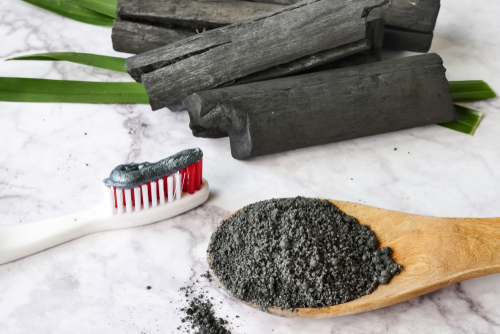Social media is a powerful launchpad for health and beauty trends, especially those marketed as natural or holistic. Wellness teas, detox foot pads, oil pulling: these products often gain traction not because of clinical evidence, but because of viral appeal. Charcoal toothpaste falls into that same category. It has been extensively promoted by influencers and wellness bloggers for its supposed whitening and detoxifying effects. And because of its bold, unusual appearance, it’s easy to remember (and easy to market!). But beneath the black smear and bold claims, this trend may be causing more harm than good.
What Is Charcoal Toothpaste and Why Is It Trending?
 Charcoal toothpaste contains activated charcoal, a finely-ground black powder made from materials like coconut shells or wood, as one of its main ingredients. This gives the toothpaste a dark color and gritty feel.
Charcoal toothpaste contains activated charcoal, a finely-ground black powder made from materials like coconut shells or wood, as one of its main ingredients. This gives the toothpaste a dark color and gritty feel.
Activated charcoal is similar in composition to regular charcoal, but it is heat-treated to make it extra porous. All those tiny holes give it a large surface area, which helps it trap and retain toxins and other chemicals. In medical contexts, it can help treat certain kinds of poisoning or overdose because of its absorbency.
Companies promoting charcoal toothpaste claim that the charcoal helps you trap and scrub away stains and toxins from your mouth when you brush. But are these claims true?
Does Charcoal Toothpaste Live Up to Its Whitening Claims?
Before we get into it, let’s be clear: we’re all for individuals putting their health and wellness first! But when influencers get paid to promote products or build their brand around certain beliefs, it can lead well-meaning folks to use something that might actually do more harm than good. It’s like trusting a fitness influencer to recommend a protein powder when they’re more focused on aesthetics than actual nutrition.
Charcoal toothpaste companies are cashing in on wellness trends, the push for natural products, and the growing fear around anything labeled as a chemical. They fuel the hype by launching new product lines and using clever marketing. Their claim is that charcoal toothpaste naturally whitens teeth, removes toxins, and gives you a deeper clean than regular toothpaste. Who wouldn’t want that?
But here’s what we actually know:
A 2024 study found that toothpaste containing activated charcoal delivered only minimal whitening results, and the authors concluded that these products should be discouraged because of the sensitivity issues they can cause. Other studies have also shown that charcoal toothpaste can increase enamel surface roughness and contribute to tooth wear. This latest research reinforces what earlier studies have already made clear: charcoal toothpaste doesn’t deliver on its promises.
Essentially, the “deep‑cleaning/toxin‑removing/mega‑whitening” claims that charcoal toothpaste companies make don’t really hold up when you look at the data. While charcoal toothpastes can remove some surface stains because of their abrasiveness, they tend not to work any better than regular toothpastes.
The Real Risks of Using Charcoal Toothpaste
But here’s the real problem: charcoal toothpaste is far too abrasive for daily use, and using it can cause micro‑damage to your enamel over time. That’s a real concern, since your enamel helps protect your teeth from decay and sensitivity, and it doesn’t grow back once it’s worn down. Plus, thinning enamel can actually make your teeth look more yellow over time, since the dentin underneath is naturally darker. So instead of getting a whiter smile, you could end up with the opposite.
Additionally, many charcoal toothpastes don’t contain fluoride, an ingredient that’s been thoroughly studied and proven to help strengthen enamel and prevent cavities. When you choose a charcoal toothpaste, especially one without fluoride, you’re not just missing out on fluoride’s proven benefits. You may also be setting yourself up for damage that could require restorative dental work down the line.
A Safer, Smarter Way To Whiten
As your dentist, our goal is to help you make informed choices that protect your oral health for the long haul. Trends come and go, but your enamel doesn’t grow back. If you’re looking to whiten your smile safely and effectively, let’s talk about options that actually work and won’t put your teeth at risk.
At Bent Tree Dental, we offer professional teeth whitening for those who want a brighter smile without the gimmicks.
- For gradual whitening, we provide take-home trays that you wear over your teeth. You’ll add a professional-grade whitening gel and wear the trays each day. In about two weeks, you’ll see a noticeably whiter smile, right from home.
- If you want faster results, we also offer in-office whitening. Just give us about 90 minutes, and you’ll walk out with a visibly whiter smile after one visit.
Professional whitening results are much longer-lasting than store-bought products. They don’t just fade like a suntan. However, things like coffee, tea, wine, or smoking can stain your teeth again over time. That’s why we provide take-home trays for easy touch-ups after your regular cleanings.
If you’re serious about whitening, skip the charcoal toothpaste. Come see us. We’ll help you whiten safely and keep your smile bright for the long haul.
Let’s Find a Whitening Option That Actually Works
Charcoal toothpaste might catch your eye on social media, but when it comes to your teeth, trends don’t always mean safe or effective. Despite the hype, the whitening power of charcoal toothpaste is minimal at best, and the risks to your enamel are real. Over time, that black paste can actually leave your smile looking duller and feeling more sensitive.
At Bent Tree Dental, we’re here to help you make smart, evidence-based choices for your smile. Contact us today for personalized recommendations tailored to your needs and goals.

